 Delite Cables Private Limited, the Vadodara-based contractor who eventually took up the work, overshot the deadline by around two years.
Delite Cables Private Limited, the Vadodara-based contractor who eventually took up the work, overshot the deadline by around two years.
Every evening for two decades, as harsh focus lights lit up Pipavav port’s jetties, Shiyal Bet, an island barely 600 metres from the Pipavav coast in Jafrabad taluka of Gujarat’s Amreli district, would soak in the warm glow, hoping to some day emerge from the dark. But the shadows only kept getting longer and Shiyal Bet remained on the records as one of the country’s 18,000-plus unelectrified villages. That changed on the morning of June 11.
At 8 am that morning, the islanders, responding to sarpanch Hamir Shiyal’s notice, gather near the newly built government primary school building to witness their village getting connected to the electricity grid. But instead of sitting under a dome erected for the occasion, they settle down on the banks of the nearby Ganga pond. At 9 am, as the helicopter carrying Chief Minister Anandiben Patel lands on the edge of the pond, they let out a loud cheer. They have never seen a helicopter — or the chief minister — from this close.
For the next hour or so, the villagers sit through the inauguration ceremony, clapping on cue as the CM and other dignitaries, including local MLA Hira Solanki, speak. “This is a historic day,” says Patel. But the islanders will have to wait a few more hours to witness “history” — the lights, the sarpanch has told them, will come on only in the evening.
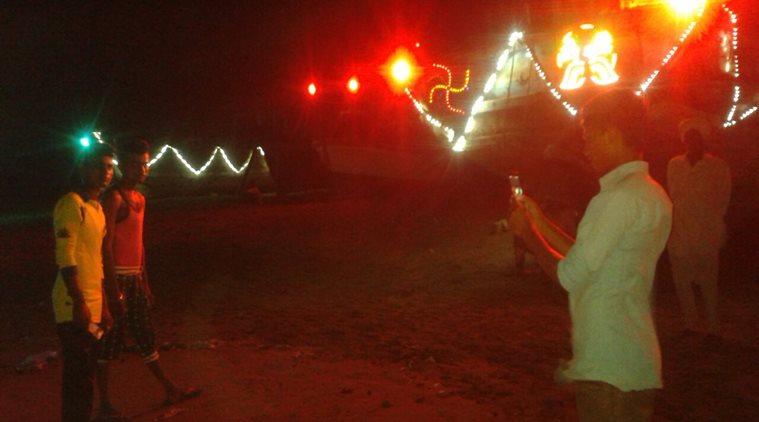 Soon, hordes of villagers make a beeline for the school building, the newest landmark on the island.
Soon, hordes of villagers make a beeline for the school building, the newest landmark on the island.
A marine cable from Pipavav port could have brought electricity to Shiyal Bet’s 5,000 residents, but that was ruled out due to the heavy traffic at the port. Solar lighting wasn’t an option either since the island has high humidity levels round the year.
So in 2008, the state government decided to lay an underwater cable from Chanch Bandar harbour, around six kilometres east of the island. But the technical challenges were daunting and there were no takers for the three tenders the government floated. Delite Cables Private Limited, the Vadodara-based contractor who eventually took up the work, overshot the deadline by around two years.

Around 10 am, soon after the VIPs have left the island, helpers and linemen of Paschim Gujarat Vij Company Limited (PGVCL), a state government-owned power distribution company, swing into action. They have divided the village into five zones and set up a transformer in each of them.
While linemen test the distribution lines in each zone, the helpers go house to house, distributing free LED lamps. But watching an electric lamp come alive is still a few hours away.
Watch Video: What’s making news
[youtube=http://www.youtube.com/watch?v=videoseries&w=640&h=390]Soon, hordes of villagers make a beeline for the school building, the newest landmark on the island. They inspect every room and look up curiously at the tubelights and the ceiling fans. Almost all of them peep into the electric room, which houses the building’s panels and switch-boards.
Sanskrit teacher Jayantilal Joshi, 55, sits in the school library, listlessly watching villagers overrun the building. The fan over his head is quiet, his cellphone has long gone dead. “Things will change for the better now. The village community hall, out of which the school functioned since 2009, had a solar panel to recharge our mobile phones and light up a bulb whenever required. But here, we will have enough electricity,” says Joshi.
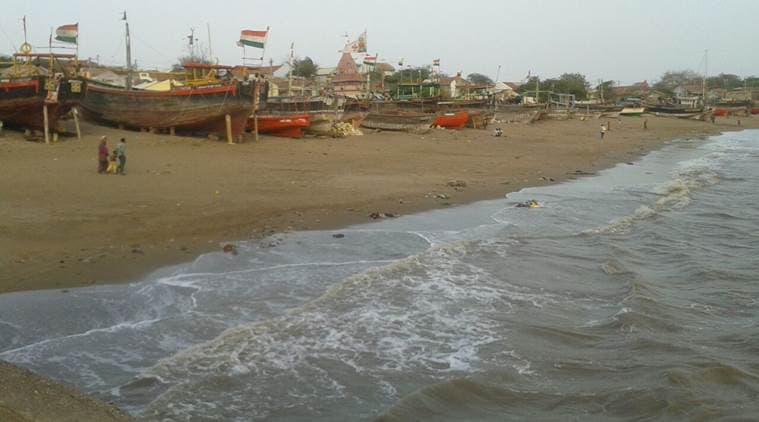 By now, the excitement of the inauguration has tapered off and the villagers, most of them fishermen and casual workers on the mainland, head home for lunch.
By now, the excitement of the inauguration has tapered off and the villagers, most of them fishermen and casual workers on the mainland, head home for lunch.
It’s now 1.30 pm. Principal Janmejay Chauhan, in between requesting villagers to vacate the school building, says the state government had sanctioned half a dozen computers a few years ago. “But we requested the authorities to allot them to other schools as we didn’t have electricity. Now, we will demand 10 computers for our students,” he says.
By now, the excitement of the inauguration has tapered off and the villagers, most of them fishermen and casual workers on the mainland, head home for lunch. A few youngsters hang out at the paan-cum-provision store of Hari Shiyal to watch a movie on his television set. “I installed this TV for my customers… it runs on solar power,” he says.
Around 6 pm, sitting on a chair in his hut near Ramji temple, fisherman Bhupat Shiyal, 38, is eagerly staring at a television set kept in a corner of the room. He is watching news on TV, but the roar of the diesel generator in his front yard drowns out the voice of the anchor. “There’s no sign of electricity yet. But I wanted to watch news of the CM’s visit so I started my generator,” says Bhupat.
Bhupat and his brothers had bought the diesel engine and generator to run their flour mill. But for the last two years, business has been bad and now they run the generator for a few hours every evening to watch news and movies on TV. The family has a solar panel but the battery is low on charge and Bhupat’s wife Labhu is cooking their evening meal in a dark corner of the house. “There is electricity at my parents’ home in Rajula taluka. For 20 years, I have been cooking in the dark. Hopefully, that will change once we get electricity. I plan to watch more TV and switch on a fan if it’s hot,” she says.
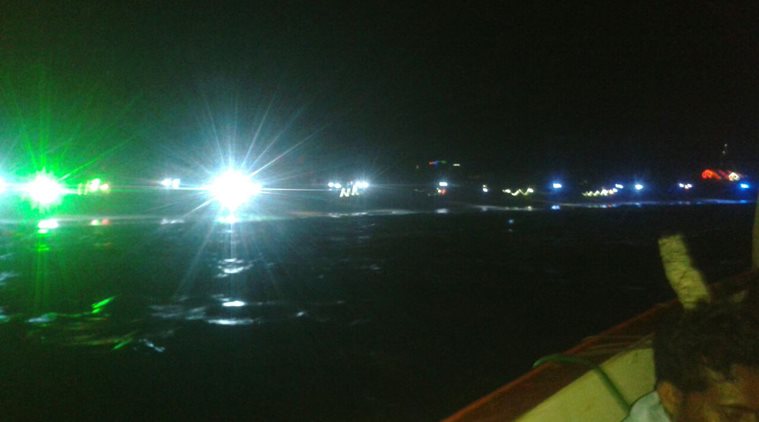 “Now that we have electricity, I will probably buy a refrigerator and start selling soft drinks,” he says.
“Now that we have electricity, I will probably buy a refrigerator and start selling soft drinks,” he says.
As dusk falls, Bhupat switches on his lamp. No sign of electricity yet. “Maybe they haven’t connected the cable to the grid yet,” he says, looking out of the door.
A few metres away, at Jay Chamunda Paan Centre, Mansang Shiyal casts frequent glances at the pulsating green light on an electric metre that the PGVCL team has fixed in his shop. “Now that we have electricity, I will probably buy a refrigerator and start selling soft drinks,” he says.
As elder brother Rupchand arrives to take charge of the shop, Mansang performs the evening pooja and leaves. But no sooner has he reached the village chowk than a bright lamp in the house of one Chotha Shiya catches his attention. “Hey! They have switched it on. Let me check mine,” he says and rushes back to his shop to switch on a lamp. The light is dazzling and a few children who have come to the shop to buy sweets shield their eyes with their palms.
As darkness gathers, more people come to the square near Mansang’s shop. Soon, the decorative lights that PGVCL engineers had set up along the west coast of the island, light up. Some distance away, the community hall and the panchayat office go green, pink, red and blue by turns. “Vah! Shu light chhe (What brilliant lights)!” exclaims a voice from the gathering.
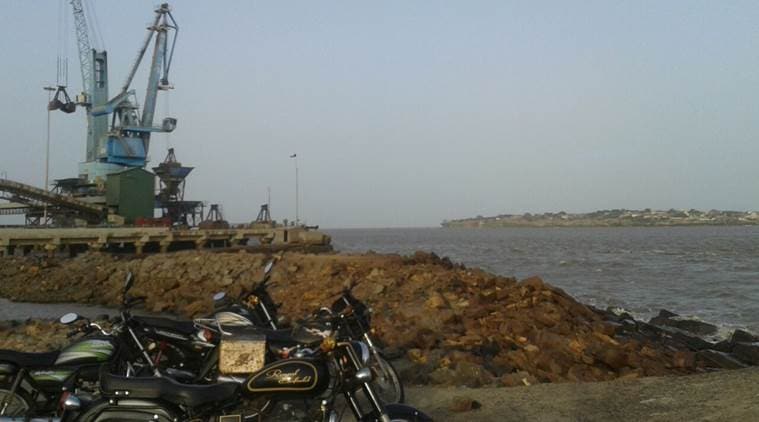 Soon, sarpanch Hamir comes to the square on his bike, talking incessantly on his cellphone.
Soon, sarpanch Hamir comes to the square on his bike, talking incessantly on his cellphone.
Soon, sarpanch Hamir comes to the square on his bike, talking incessantly on his cellphone. He has been swamped with calls of complaints from islanders whose lamps have not lit up. Lakhman Shiyal, 66, former president of Shiyal Bet Boat Association, is one of them. “There is no power at my residence. They have not connected the service cable to the grid,” he complains to the sarpanch.
“Have you done the wiring properly? Do what the PGVC people have told you or else you will never get any light,” the sarpanch replies tersely before climbing up the steps of Hanuman temple with his friend for a better view of the lit-up panchayat building.
Chotha Shiyal’s home has light, but a lot of darkness too. PGVCL had given him two LED bulbs, but he only has one bulb-holder. The 22-year-old, who works as a labourer on board fishing trawlers, has used the sole bulb to light up the centre of the house. His sister Asha is cooking in the dark. Next door, at the shop the family runs, Chotha’s younger brother Nana is sitting hunched over some books. “I have to finish my homework before sunset as our solar battery lasts for only two hours,” says Nana, a Class X student.
Cheers and shrill cries of young men down the sandy Nana Kor beach draws Chotha’s 60-year-old father Kana Shiyal out of his house. “Arrey, wah!” he exclaims, watching the lit-up beached fishing trawlers and their rippling reflection in the rising sea.
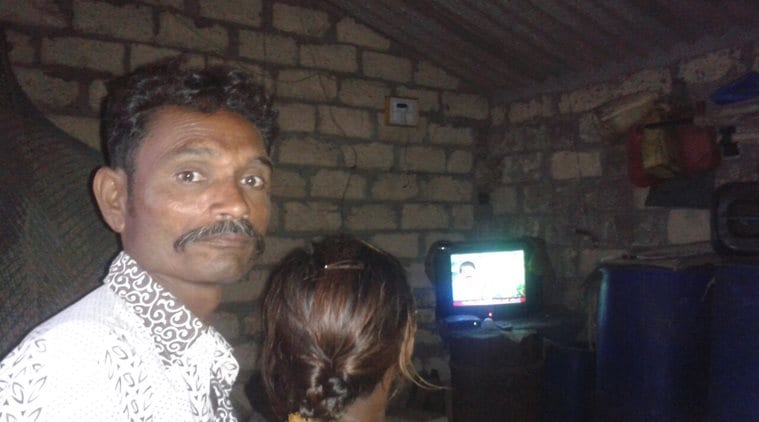 Some distance away, the community hall and the panchayat office go green, pink, red and blue by turns.
Some distance away, the community hall and the panchayat office go green, pink, red and blue by turns.
Soon, people descend in hordes from the hillocks of the island onto the beach. The young hold up their cellphones for photographs of the lit-up boats and take selfies. Villagers say the only time so many people gather on Nana Kor beach is during Naliyeri Poornima in August, when fishermen worship the sea at the start of the fishing season.
It’s 8.45 and a dozen PGVCL linemen and helpers, led by executive engineer Kamal Kant Saini, reach the landing platform of the island. It has been a long day of work under the scorching summer sun and many still have their helmets on. The team gets on to a boat which soon sets sail. Without life jackets and with the dark waves lashing at the boat, the 10-minute boat ride to the mainland is unnerving, but Saini and his men are all smiles.
As their boat enters the Pipavav port, Vimal Solanki, a lineman, looks at the lit-up island in the distance and shouts: “Wah Shiyal Bet, wah!”






